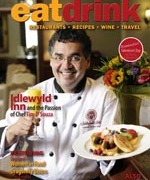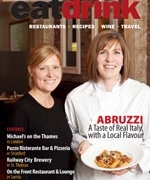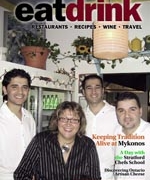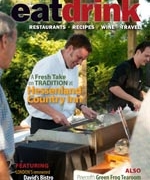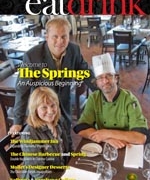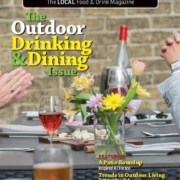Literary Food for Thought
Michael Pollan has become a writer of distinction in two ways. His writing is held in high esteem with numerous awards to its credit, and his distinct and specialized focus on food writing has made him an expert in the field (or as Stephen Colbert put it in an interview in 2013 when Pollan released Cooking: A Natural History of Transformation – “Michael, I think you have a food-book problem). Pollan’s breakthrough food manifesto, The Omnivore’s Dilemma: A Natural History of Four Meals, came out in 2006 and needs no further accolades after receiving numerous awards, including the prestigious James Beard Award and a nod as one of The New York Times 10 Best Books of the Year. Since then, Pollan has written In Defense of Food: An Eater‘s Manifesto, a continuation of his food studies, as well as a children’s version of The Omnivore’s Dilemma and, most recently, a thin, instructional guide, Food Rules: An Eater’s Manual, on putting his philosophies into action at the dinner table.
The Omnivore’s Dilemma was an ethical quest to slaughterhouses and organic farms and through forests to find out where our food comes from, and In Defense of Food is a natural progression to help us learn what food does to our bodies and how unhealthy diet is linked to chronic illness. The science of nutrition has lead us to believe that “food is not a system but rather the sum of its nutrient parts” and we should not think of a food item for what it appears to, but rather for how many calories, carbohydrates, fats, and so on it contains. Pollan argues that this type of thinking not only confuses our perception of food, but has been detrimental to our collective health since the 1970’s. “Often food science’s efforts to make traditional foods more nutritious make them much more complicated, but not necessarily any better for you.” Pollan says that focusing less on the nutritional aspects would be more beneficial because “that’s the great thing about eating foods as compared to nutrients: You don’t need to fathom a carrot’s complexity in order to reap its benefits.” He is taking the science out of eating and being practical with our food choices by eating real food, not what he labels “edible foodlike substances.” This is not always easy in the modern world heavy with processed food, but he suggests putting less emphasis on the biochemical associations and simply treat what we eat as food.
He has narrowed down years of research in the food industry to seven words: Eat Food. Not Too Much. Mostly Plants. These three, short sentences are his mantras to make eating simpler and have become a common thread throughout all his books and all his rules lead back to these few words. Food Rules is a slim volume of advice that takes this practical approach a step further by succinctly breaking down easy-to-follow eating policies or “algorithms designed to simplify your eating life” (xx). It is a scaled-down version of what people expect from a diet book. It is a healthy living manifesto that could transform your diet along the way. And it might just work to get people thinking about more healthy and mindful eating. Food Rules is actually an off-shot of In Defense of Food; each of the short rules are directly from the previous book, but with fewer words to back them up.
There are 64 rules in the book, some of them so simple and brief it’s laughable they made it into the book, like Rule #36: Don’t eat breakfast cereals that change the color of the milk. Even though Pollan is now known for cerebral books backed by extensive research in the food world, this is very different than his other books. He admittedly falls back on advice (or wives’ tales, as they might be known) of generations of grandmothers, such as “Better to pay the grocer than the doctor” in Rule #44 which urges people to buy better quality food even if it costs more, in order to keep away from unhealthy, processed food. Most of the rules are aimed at steering people away from processed food. This is achieved with rules such as Rule #19: If it came from a plant, eat it; if it was made in a plant, don’t and Rule #7: Avoid food products containing ingredients that a third-grader cannot pronounce. The real food Pollan is trying to get people to use more consistently resembles the natural food in The Omnivore’s Dilemma from the chapter entitled “The Perfect Meal” when he hunted and foraged all the food for his meal with his own hands.
Pollan spends a lot of time talking about corn as if it has taken over the supermarkets, but at first it doesn’t seem like a bad thing. Corn products are used to make myriad processed food, but it is a vegetable so isn’t that good? One of the bad effects is that most of the world’s corn supply is used to feed animals that don’t naturally eat corn and that makes our meat supply not as healthy as grass-fed animals. Organic farming has become the healthy option, but even it can be caught up in the controlling big business of agriculture, although it has been successful in eliminating many chemicals used in farming; the downside is that food in the supermarket can be organic, but has travelled around the world with many “food miles” behind it.
From a continuity perspective, even though Food Rules is his most recently published book, I would recommend reading it before In Defense of Food. The policies in Food Rules are verbatim sound bites from the previous book. Having first seen the pared down rules, In Defense of Food adds to them; whereas conversely if you read Food Rules second, it simply feels like you’ve already read it, but a repeat reading with more research to support it, feels more like a successful reiteration.
I also like that there is a Young Readers Edition of The Omnivore’s Dilemma. It is targeted for 8-12 year olds, but would appeal to socially-responsible teens and is even complex enough for an adult reader. The book cover may appear more cheerful (with a veggie and fruit smiley face on a bright purple background) but it carries the same serious message as the original and the chapters are laid out the same, although full of previously unpublished pictures and statistical graphs. Even though scaled down from the adult version of the eloquent and philosophical treatise on food, it is still quite hefty for a children’s book and feels more like a science lesson or an educational journey around supermarkets and farms. It begins with the image of a burger and fries to grab kids’ attention with familiar items, but goes on to point out how potatoes are grown with toxic pesticides and cattle feedlots are unsanitary. but it does not pull any punches – cows living in mountains of their own manure get children thinking about where their burgers come from and “finding out how our potatoes are grown might scare you off French fries for the rest of your life.” Not that Pollan aims to scare children, but his type of education is not sugar coated. He playfully encourages children to become food detectives to find out about their food, just like he has done with his investigative legwork on following the path of a corncob from field to plate, buying his own feedlot cow to watch it grow, and hunting wild pigs.
Pollan hasn’t only written books about food and his two most recent publications often refer to growing natural food and eating mostly plants which harkens back to his earlier works about gardening and plant-life in The Botany of Desire: A Plant’s-Eye View of the World and Second Nature: A Gardener’s Education. He is also a prolific writer in mainstream periodicals and he makes appearances in the media circuit, on NBC Nightly News, Anderson Cooper’s 360, and recently on Oprah talking about the benefits of a vegan diet. Pollan is confident that being mindful of our food leads to more pleasure in eating and a healthier lifestyle. He encourages young readers in The Omnivore’s Dilemma to “vote with your fork” to break the binds of the processed diet, since we have entered a post-industrial era where it is possible to enjoy bar-code free products through the organic movement, local agriculture, farmers’ markets, and humanely-raised meat. The ideas in Food Rules are really too simple, to be honest, and are just pure common sense, not loaded with meal plans or low fat recipes. But sometimes omnivorous humans need to be reminded of common sense, and there is no better authority than Pollan.


